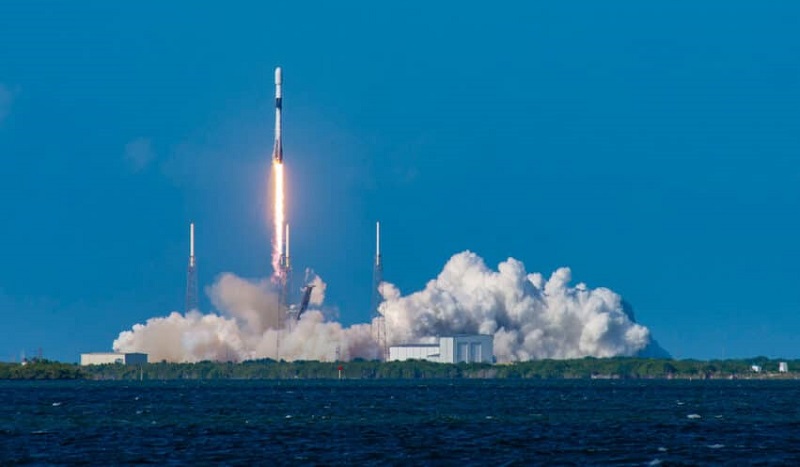-
Donation campaign June 2022
Dear reader friends. We are launching a new donation campaign for this month of June and we are counting on you to help us continue our information work. As you know, there is a cost to maintaining and running our site, and we depend almost entirely on your donations to fund it. Réseau International needs you more than ever to ensure the continuity of its work of reflection and re-information
Total donations €2,500.00
by Flower Brush.
China must be able to disable or destroy SpaceX’s Starlink satellites if they pose a threat to national security. This is at least the opinion of a group of Chinese army researchers, who have just published in a national academic journal, Modern Defense Technology, a document in which they propose a series of countermeasures aimed at hurt the American satellite network.
The Starlink constellation currently has nearly 2,400 satellites. This high-speed Internet access service has grown exponentially over the past three months and now has more than 400,000 users worldwide. But this success does not seem to please Yuanzhen Ren, a researcher at the Beijing Institute of Tracking and Telecommunications, who has just authored a study presenting different ways to develop China’s anti-satellite capabilities – a study co-authored by several top scientists from the world. Chinese defense industry.
« A combination of ‘soft’ and ‘hard’ destruction methods should be adopted to cause certain Starlink satellites to lose their functions and destroy the constellation’s operating system, » they wrote in the document, according to the South China Morning. Post. In particular, they mention the establishment of a large-scale, high-sensitivity surveillance system to track each of the Starlink satellites. It is not known to date whether or not this document reflects the official position of the entire Chinese government.
An alliance with the American Defense considered suspicious
Elon Musk has always been appreciated, even admired by the Chinese, the latter being particularly tech-savvy – China is one of the most important markets for Tesla. The billionaire was considered a model of innovation. Its popularity began to waver, however, last year, when Starlink satellites twice nearly collided with China’s under-construction space station Tiangong – forcing China to perform evasive maneuvers. In December, Beijing even filed a complaint with the Office for Outer Space Affairs of the UN against the American operator. China then accused the United States of not respecting the Space Treaty by endangering its astronauts.
Space is big, but Earth’s orbit is more limited. In addition to the many space debris which already pose a permanent threat to space stations and vessels, the proliferation of Starlink mini-satellites is only making the situation worse. Every week they are involved in nearly 1600 close spacecraft encounters! Hugh Lewis, head of the Astronautics Research Group at the University of Southampton, UK, estimates that eventually Starlink network satellites will be involved in 90% of all conjunctions under one kilometer.
But it’s not so much the increased risk of collisions that worries Ren and his co-authors. They point to the fact that Starlink connections could increase the data transmission speed of American drones and stealth planes more than 100 times. Additionally, SpaceX has signed a contract with the US Department of Defense to develop new technologies based on the Starlink platform. Chinese scientists are talking about sensitive instruments capable of detecting and tracking hypersonic weapons. Starlink satellites are also equipped with ion thrusters, which allow them to quickly change orbit in preparation for an offensive against enemy space targets, they report.
Indeed, the SpaceX constellation could be exploited for other purposes. In 2020, two engineers from the Radionavigation Laboratory at the University of Texas at Austin, for example, presented a system based on the same satellites, capable of providing location accuracy 10 times greater than GPS, while being much less subject to interference – a « difficult to block » navigation system, according to the MIT Technology Review.
Robustness and flexibility that scare the Chinese
Given the number of Starlink satellites in orbit, the system is considered particularly robust; even if a few were to malfunction, the system as a whole would not be affected. This is why Chinese scientists are working to develop new anti-satellite capabilities.
For example, they suggest launching satellites carrying military payloads in the middle of a batch of Starlink devices. The Chinese military must also improve its surveillance systems, to obtain highly accurate images from these satellites so that experts can identify any unusual features, they added. The country must also be able to intercept signals from each Starlink satellite to detect any threats.
The direct approach (destruction by missile) was ruled out: not only would it produce too much debris, but it would be too costly and not “profitable”. “The Starlink constellation is a decentralized system. The confrontation is not about individual satellites, but about the whole system. This requires low-cost, high-efficiency measures,” the researchers said.
China is said to already have some anti-satellite technologies, including lasers and communication jammers. A Beijing-based space scientist, who was not involved in this study, points out that the mainstream Chinese view is not to attack the Starlink network, but to adopt « constructive » countermeasures. “It means building our own internet satellite networks,” he told the South China Morning Post – China has actually launched a similar project to Starlink named StarNet. In any case, this document sounds like an open call for an attack by Starlink, underlines the specialist.
source: Trust my science
